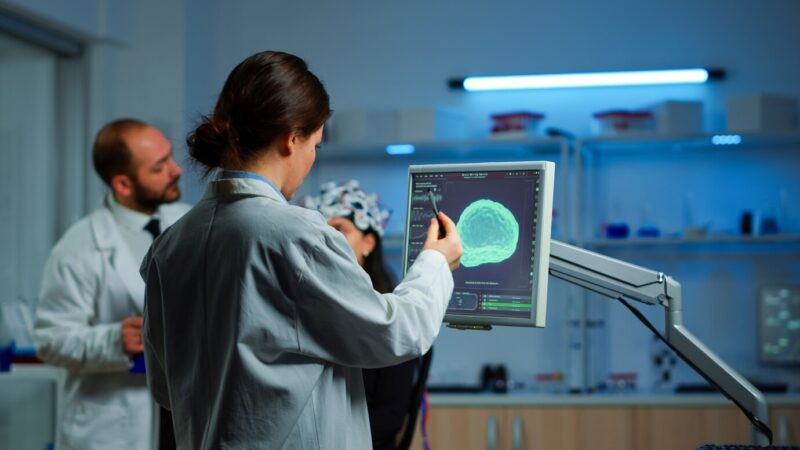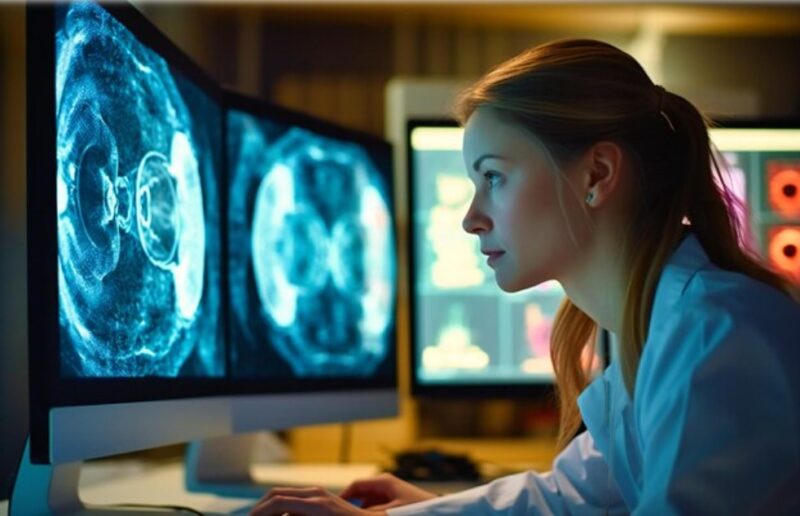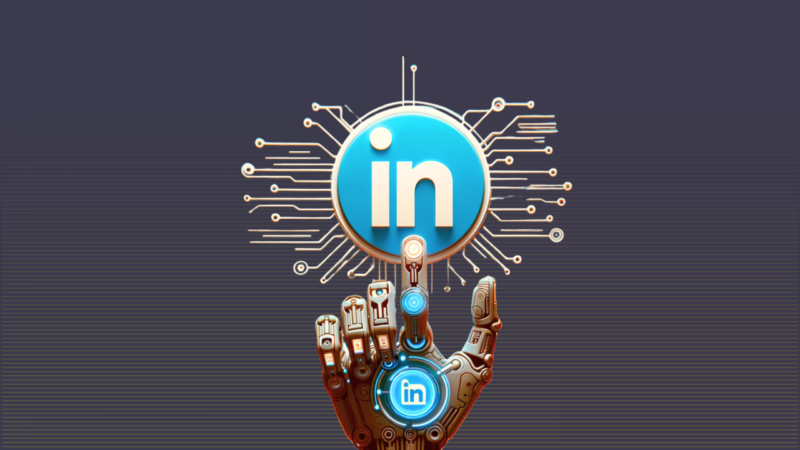The healthcare sector is witnessing a revolutionary transformation, thanks to the integration of Artificial Intelligence (AI) and Machine Learning (ML). These technologies are not just buzzwords but pivotal tools reshaping the landscape of medical diagnostics and treatment.
The domain of oncology, in particular, has seen significant advancements with the introduction of Artificial Intelligence and ML, enhancing the efficiency and precision of cancer care. This blog post delves into how AI and ML are being harnessed to detect, diagnose, and treat cancer, promising a new era of personalized and advanced healthcare solutions.
Traditional Cancer Diagnosis Methods

Traditional cancer diagnosis relies heavily on a combination of clinical assessments, imaging tests, biopsies, and laboratory tests. Techniques such as mammography, colonoscopy, and PSA tests are standard practices for detecting various cancers.
However, these methods come with limitations, including false positives or negatives, invasiveness, and reliance on the subjective interpretation of results. The challenges associated with traditional diagnostic techniques underscore the need for more accurate, less invasive, and highly efficient methods to improve early detection and patient outcomes.
Introduction to AI and Machine Learning
AI refers to the simulation of human intelligence in machines programmed to think like humans and mimic their actions. Machine learning, a subset of AI, involves the ability of these systems to automatically learn and improve from experience without being explicitly programmed.
Artificial Intelligence and ML find applications across various fields, from autonomous vehicles to financial forecasting, and significantly, in healthcare. By analyzing vast amounts of data, these technologies can identify patterns and insights that are beyond human capabilities.
Early Detection with AI

Early detection of cancer significantly increases the chances of successful treatment. Artificial Intelligence and Machine Learning algorithms excel in identifying subtle patterns in data that may indicate the presence of cancer at an early stage.
For instance, AI-powered tools can analyze genetic information or medical imaging more accurately and swiftly than traditional methods. Systems like IBM Watson Oncology and Google’s DeepMind Health are pioneering examples, offering tools that assist in the early detection of skin cancer, breast cancer, and more.
Imaging Analysis
AI and ML significantly enhance imaging analysis, making it a powerful tool in cancer diagnosis. These technologies improve the accuracy of interpreting imaging results from MRIs, CT scans, and X-rays.
By employing deep learning algorithms, AI can detect abnormalities and patterns indicative of cancer with a higher precision rate than human radiologists. This not only speeds up the diagnostic process but also reduces the rates of false positives and negatives, leading to more accurate diagnoses and treatment plans.
Personalized Treatment Plans

Personalized medicine is at the forefront of oncology, tailoring treatment plans to the individual characteristics of each patient’s cancer. Artificial Intelligence and ML play a crucial role in analyzing vast datasets from genetic tests, medical histories, and research studies to identify the most effective treatment options for a particular patient.
This approach enhances the efficacy of treatments, minimizes side effects, and significantly improves the quality of life for cancer patients.
Predictive Analytics in Treatment
Predictive analytics leverage AI and ML to forecast the outcomes of various treatment plans, helping oncologists make informed decisions about patient care. By analyzing data from previous cases, current research, and individual patient profiles, these technologies can predict responses to treatments, potential side effects, and survival rates.
This predictive capability enables a more strategic approach to treatment, optimizing patient care and potentially saving lives.
Advantages of AI in Cancer Care
The incorporation of AI and ML into cancer care brings numerous advantages. These technologies enhance diagnostic accuracy, streamline the treatment process, and personalize patient care, leading to better outcomes.
Additionally, Artificial Intelligence and ML can process and analyze data at an unprecedented speed, reducing the time from diagnosis to treatment initiation. This not only improves efficiency but also significantly reduces the workload on healthcare professionals, allowing them to focus more on patient care.
Challenges and Limitations

Despite their potential, the application of AI and ML in cancer diagnosis and treatment faces challenges and limitations. Ethical concerns regarding patient data privacy, the need for large and diverse datasets to train algorithms, and the risk of biases in AI models pose significant hurdles.
Furthermore, the high cost of developing and implementing these technologies can limit access, particularly in low-resource settings. Addressing these issues is crucial for the broader adoption and ethical use of Artificial Intelligence in healthcare.
Case Studies
Several successful case studies highlight the impact of AI in oncology. One notable example is the use of Google’s DeepMind Artificial Intelligence to analyze eye scans, accurately detecting early signs of diabetic retinopathy, a condition that can lead to blindness if untreated.
Another example is the use of AI algorithms by PathAI to improve the accuracy of breast cancer diagnosis from biopsy samples, demonstrating a significant reduction in diagnostic errors. These real-world applications underscore the potential of AI to revolutionize cancer care.
Future Directions
The future of AI and ML in cancer diagnosis and treatment is bright, with ongoing research and development promising even more innovative solutions. Advances in predictive analytics, personalized medicine, and non-invasive diagnostic techniques are on the horizon.
Furthermore, the integration of Artificial Intelligence with emerging technologies such as CRISPR for gene editing and nanotechnology for targeted drug delivery could further revolutionize cancer care, offering new hope for patients around the world.
Conclusion
AI and ML are transforming the field of oncology, making strides in early detection, diagnosis, and personalized treatment of cancer. These technologies offer the potential to significantly improve patient outcomes, streamline healthcare processes, and pave the way for innovative treatments.
There is an online platform, Doctor.Global where people can find clinics worldwide that, among other things, use AI and ML in cancer treatment.
While challenges remain, the ongoing advancements in Artificial Intelligence and ML hold immense promise for the future of cancer care, symbolizing a beacon of hope for patients and a testament to the power of technology in advancing human health.

FAQs
What is Artificial Intelligence (AI) in healthcare?
Artificial Intelligence in healthcare refers to the use of algorithms and software to approximate human cognition in the analysis, interpretation, and comprehension of complex medical and healthcare data.
How does AI help in cancer diagnosis?
AI helps in cancer diagnosis by analyzing medical images, such as MRIs and CT scans, more accurately and rapidly than traditional methods.
Can AI in oncology predict treatment outcomes?
Yes, Artificial Intelligence can predict treatment outcomes by utilizing predictive analytics. It analyzes vast amounts of data from previous cases, ongoing research, and patient health records to forecast how patients might respond to various treatments, their potential side effects, and overall survival chances.
What are the challenges of implementing AI in cancer care?
Challenges include ethical concerns around data privacy, the need for large and diverse datasets to train AI models without bias, the high cost of technology development and implementation, and the requirement for healthcare professionals to adapt to new technologies.
What is the future of AI and ML in cancer treatment?
The future of AI and ML in cancer treatment includes advances in personalized medicine, predictive analytics, and non-invasive diagnostics.











